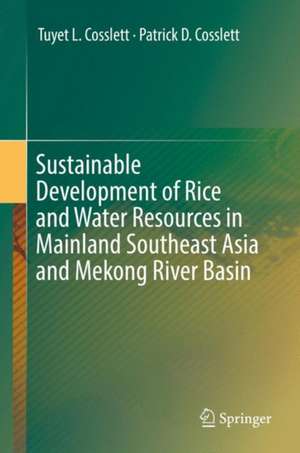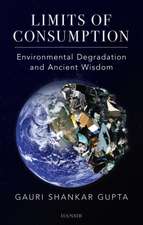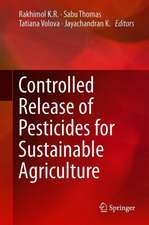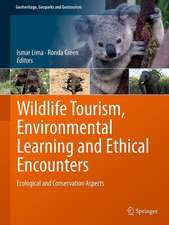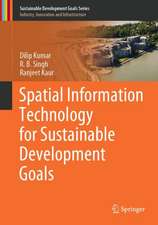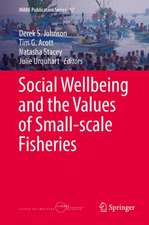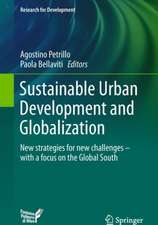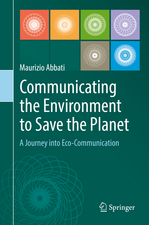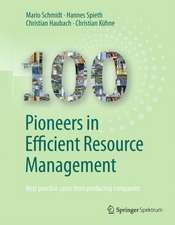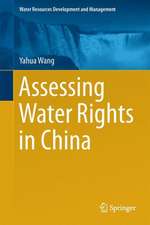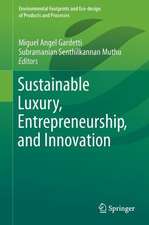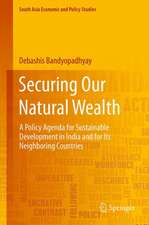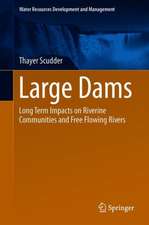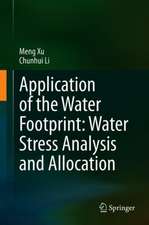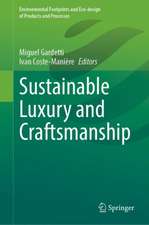Sustainable Development of Rice and Water Resources in Mainland Southeast Asia and Mekong River Basin
Autor Tuyet L. Cosslett, Patrick D. Cossletten Limba Engleză Hardback – 5 oct 2017
| Toate formatele și edițiile | Preț | Express |
|---|---|---|
| Paperback (1) | 520.61 lei 3-5 săpt. | |
| Springer Nature Singapore – 30 ian 2019 | 520.61 lei 3-5 săpt. | |
| Hardback (1) | 640.55 lei 3-5 săpt. | |
| Springer Nature Singapore – 5 oct 2017 | 640.55 lei 3-5 săpt. |
Preț: 640.55 lei
Preț vechi: 753.60 lei
-15% Nou
Puncte Express: 961
Preț estimativ în valută:
122.57€ • 131.07$ • 102.20£
122.57€ • 131.07$ • 102.20£
Carte disponibilă
Livrare economică 28 martie-11 aprilie
Preluare comenzi: 021 569.72.76
Specificații
ISBN-13: 9789811056123
ISBN-10: 9811056129
Pagini: 190
Ilustrații: X, 148 p. 7 illus. in color.
Dimensiuni: 155 x 235 mm
Greutate: 0.42 kg
Ediția:1st ed. 2018
Editura: Springer Nature Singapore
Colecția Springer
Locul publicării:Singapore, Singapore
ISBN-10: 9811056129
Pagini: 190
Ilustrații: X, 148 p. 7 illus. in color.
Dimensiuni: 155 x 235 mm
Greutate: 0.42 kg
Ediția:1st ed. 2018
Editura: Springer Nature Singapore
Colecția Springer
Locul publicării:Singapore, Singapore
Cuprins
Introduction.- 1. The Setting of Cambodia, Laos, Thailand, and Vietnam.- 1.1 Topography.- 1.1.1 Cambodia.- 1.1.2 Laos.- 1.1.3 Thailand.- 1.1.4 Vietnam.- 1.2 Population.- 1.2.1 Cambodia.- 1.2.2 Laos.- 1.2.3 Thailand.- 1.2.4 Vietnam.- 1.3 Workforce.- 1.3.1 Cambodia.- 1.3.2 Laos.- 1.3.3 Thailand.- 1.3.4 Vietnam.- 1.4 Economy.- 1.4.1 Cambodia.- 1.4.2 Laos.- 1.4.3 Thailand.- 1.4.4 Vietnam.- References.- 2. Rice Cultivation, Production, and Consumption in Cambodia, Laos, Thailand, and Vietnam.- 2.1 Rice Cultivation.- 2.1.1 Cambodia.- 2.1.2 Laos.- 2.1.3 Thailand.- 2.1.4 Vietnam.- 2.2 Rice Production.- 2.2.1 Cambodia.- 2.2.2 Laos.- 2.2.3 Thailand.- 2.2.4 Vietnam.- 2.3 Rice Consumption.- 2.3.1 Cambodia.- 2.3.2 Laos.- 2.3.3 Thailand.- 2.3.4 Vietnam.- 2.4 Conclusion.- References.- 3. Rice trade of Cambodia, Laos, Thailand, and Vietnam.- 3.1 Background of rice exports of Thailand, Vietnam, and Cambodia 1855-1999.- 3.1.1 Thailand.- 3.1.2 Vietnam.- 3.1.3 Cambodia.- 3.2 Policies of rice export of the four countries in the new millennium.- 3.2.1 Thailand.- 3.2.2 Vietnam.- 3.2.3 Cambodia.- 3.2.4 Laos.- 3.3 Performance of rice exports of Thailand, Vietnam, and Cambodia in 2000-2014.- 3.3.1 Rice export relative to world rice export.- 3.3.2 Rice export relative to milled rice production.- 3.4 Rice trade of the four countries in 2000-2014.- 3.4.1 Rice trade balance.- 3.4.2 Rice trade competition.- 3.5 Rice across border trade.- 3.5.1 Cambodia border trade with Vietnam and Thailand.- 3.5.2 Laos border trade with Vietnam, Thailand, and China.- 3.5.3 Thailand border trade with Burma and China.- 3.5.4 Vietnam border trade with Cambodia, Laos, and China.- 3.6 Rice regional cooperation proposals.- 3.6.1 Council on Rice Trade Cooperation Proposal in 2002.- 3.6.2 Organization of Rice Exporting Countries Proposal in 2008.- 3.6.3 Southeast Asia Rice Association Proposal in 2012.- 3.6.4 ASEAN Rice Federationin 2012.- 3.6.5 Failures of Rice Cartel Proposals.- 3.7 Conclusion.- References.- 4. Lower Mekong Basin: Rice production, Climate change, ENSO, Chinese Mekong Dams.- 4.1 The Mekong River.- 4.1.1 The Lancang Jiang.- 4.1.2 The Lower Mekong River.- 4.2 Lower Mekong Basin setting.- 4.2.1 Topography.- 4.2.2 Population.- 4.2.3 Economy.- 4.3 Agricultural land, paddy land, and paddy rice production.- 4.3.1 Agricultural land and farming.- 4.3.2 Paddy rice production.- 4.4 Climate change, floods and droughts, and El Nino Southern Oscillation (ENSO).- 4.4.1 Assessment of climate change.- 4.4.2 Impact of floods and droughts in the Lower Mekong Basin.- 4.4.3 El Nino and La Nina of the ENSO cycle (2001-2016).- 4.5 Chinese Mekong mainstream dams.- 4.5.1 Mekong mainstream dams in China.- 4.5.2 Impacts of Chinese dams in the Lower Mekong Basin.- 4.6 Conclusion.- References.- 5. Mekong Regional Cooperation for Water Resources and Rice Security.- 5.1 Mekong River Commission Structure and Programs.- 5.1.1 MRC structure.- 5.1.2 MRC Basin development strategy.- 5.1.3 MRC Agriculture and irrigation programs.- 5.1.4 MRC Rules of Procedure for water utilization and diversion.- 5.2 MRC Review of Lower Mekong Mainstream Dams.- 5.2.1 Proposed mainstream dams in Lower Mekong Basin.- 5.2.2 MRC review of Xayaburi dam project.- 5.2.3 MRC review of Don Sahong dam project.- 5.2.4 Studies on impacts of the Lower Mekong River mainstream dams.- 5.2.5 Assessment of the Mekong River Commission.- 5.3 Mekong Regional Cooperation Organizations.- 5.3.1 Greater Mekong Subregion.- 5.3.2 Lower Mekong Initiative.- 5.3.3 Mekong-Japan Summit.- 5.3.4 Lancang-Mekong Cooperation Mechanism.- 5.4 China Role in Mekong Regional Cooperation.- 5.5 Conclusion.- References.- Conclusion.
Notă biografică
Ms. Tuyet L. Cosslett
VA, USA
Mr. Patrick D. Cosslett
VA, USA
VA, USA
Mr. Patrick D. Cosslett
VA, USA
Textul de pe ultima copertă
This book highlights rice and water resources security in Cambodia, Laos, Thailand, and Vietnam – countries that share the international Mekong River, which is a source of both regional cooperation and conflict. It discusses the topography, population, economy, rice production and rice trade of these four riparian countries, and analyses the impacts of climate change, El Nino and La Nina, and the construction of Mekong mainstream dams on water resources and rice productivity. Further, this publication assesses the role of the Mekong River Commission, a river basin organization responsible for the sustainable development and water resource management of the Mekong, and examines regional cooperation frameworks such as the Lower Mekong Initiative, and the Mekong-Japan Summit. The book then explores the emerging role of China in promoting the Lancang-Mekong cooperation between China and Myanmar, Cambodia, Laos, Thailand, and Vietnam in developing the Mekong River Basin, which could determine the future water and rice security of the region.
Caracteristici
Examines how climate change creates uncertainty regarding the continued supply of water to paddy cultivation Provides detailed analyses of the paddy land and farming, rice production policies, consumption, and trade in the four countries Assesses the Mekong River Commission’s role in promoting regional cooperation in developing and managing the water resources of the Lower Mekong Basin under the threats of climate change and mainstream dams Discusses the Lancang-Mekong Cooperation mechanism and the new chapter of political, social, and economic change in the region, including the sustainable development of water resources and rice security
